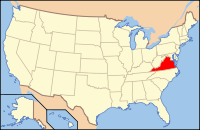Southampton County, Virginia
| Southampton County, Virginia | ||
|---|---|---|

Southampton County Courthouse
|
||
|
||
 Location in the U.S. state of Virginia |
||
 Virginia's location in the U.S. |
||
| Founded | 1749 | |
| Seat | Courtland | |
| Largest town | Courtland | |
| Area | ||
| • Total | 602 sq mi (1,559 km2) | |
| • Land | 599 sq mi (1,551 km2) | |
| • Water | 3.2 sq mi (8 km2), 0.5% | |
| Population (est.) | ||
| • (2015) | 18,109 | |
| • Density | 30/sq mi (12/km²) | |
| Congressional district | 4th | |
| Time zone | Eastern: UTC-5/-4 | |
| Website | www |
|
Southampton County is a county located in the Commonwealth of Virginia. As of the 2010 census, the population was 18,570. Its county seat is Courtland.
During the 17th century, shortly after establishment of Jamestown, Virginia in 1607, English settlers explored and began settling the areas adjacent to Hampton Roads. In 1634, the English colony of Virginia was divided into eight shires (or counties) with a total population of approximately 5,000 inhabitants. Most of Southampton County was originally part of Warrosquyoake Shire. The shires were soon to be called counties. Warrosquyoake Shire was renamed Isle of Wight County in 1637.
In 1749, the portion of Isle of Wight County west of the Blackwater River became Southampton County. Later, part of Nansemond County, which is now the Independent City of Suffolk, was added to Southampton County.
In August 1831, enslaved Nat Turner led a slave rebellion of Black slaves in Southampton County against local Whites. When the rebellion was crushed, Turner and his fellow rebels were executed. In the response to the uprising, white militias and mobs lynched approximately 200 blacks in Southampton County.
Southampton County may have been named for Southampton, a major city in England, or for Henry Wriothesley, 3rd Earl of Southampton, one of the founders of the Virginia Company and a supporter of colonization in North America.
...
Wikipedia

